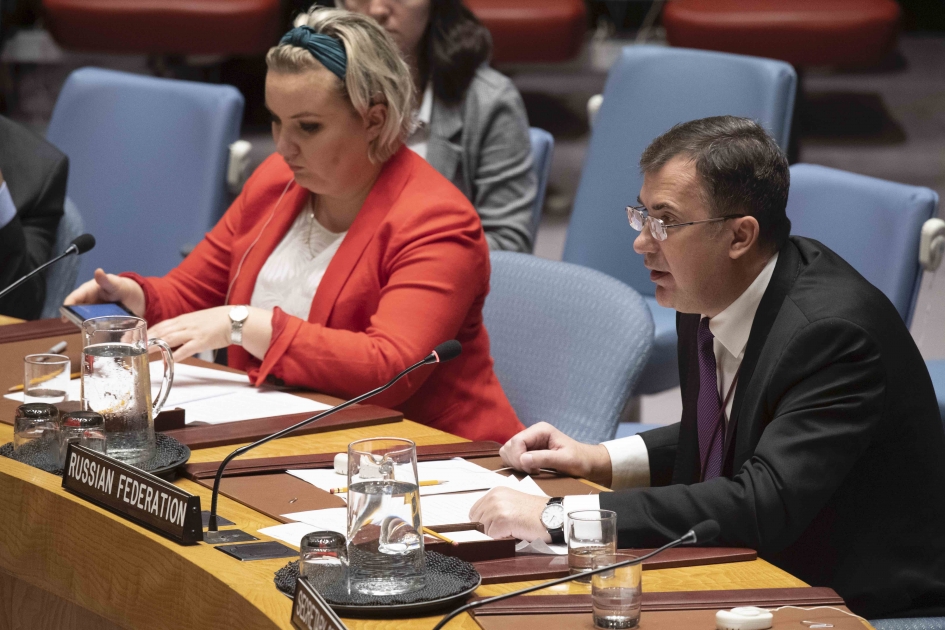Statement by Deputy Permanent Representative Gennady Kuzmin at UN Security Council briefing on women, peace, and security
Mm. Minister,
We would like to thank you for organizing this briefing.
We thank Secretary-General Antonio Guterres for his assessments of the progress of “Women, Peace, and Security” agenda. We have listened with great interest to the statement by USG, Executive Director of UN-Women Phumzile Mlambo-Ngcuka where she dwelt on Secretariat’s contribution to promoting the role of women in prevention and settlement of armed conflicts and on difficulties that remain at this track; as well as to the statements by esteemed briefers about their work “on the ground”.
Our today’s discussion confirms relevance of Security Council resolution 1325 that was adopted almost two decades ago.
The most important task of the Council in terms implementation of this resolution is to increase the role of women in peace processes, enhance their contribution thereto, and protect them from violence that they continuously encounter in armed conflicts.
Mostly, women become victims of sexual violence that is often part of war tactics. Another revolting practice is the use of women as “human commodity” in order to raise money for terrorist and criminal activity.
We call upon UN specialized agencies to engage in closer coordination with the Security Council in order to stop such blatant practices as sexual violence and human trafficking in armed conflict.
We believe it is important to avoid duplication in the work of various bodies of our organization and to focus on situations that pose undeniable threat to international peace and security in accordance with prerogatives of the Security Council. We should not forget that General Assembly, Human Rights Council, and Peacebuilding Commission also take part in efforts to empower women and ensure gender equality.
Russia calls to focus on concrete work in the interests of women in armed conflict. In particular, to develop national action plans, that should be adopted based on concrete situations of armed conflicts. Here we speak about useful and effective tools rather than mere declarative documents.
Plans to implement resolution 1325 should not be adopted for the sake of appearance, or just to “check the box”. Such cases do not constitute adequate criteria that can assess countries’ policies in the area of women’s empowerment.
In order to be effective in solving problems that exist at this track, we need active involvement of women. Therefore, we are grateful to Secretary-General for his lasting attention to the issues of expanding qualitative participation of women in peacekeeping operations, peace talks and political processes at large. Russia is UN’s reliable partner in terms of training peacekeepers (including women) in certified training centers. For example, this cooperation covers the All-Russian Institute for Advanced Training in Domodedovo (functions under the Russian Ministry of Domestic Affairs) where i.a. foreign specialists are trained.
Today we voted in support of a draft resolution, put forward by South Africa, because we are firmly convinced that we need to protect and promote rights and interests of women in armed conflict. At the same time, we have to state that the resolution we adopted contains a number of provisions that go beyond the Security Council mandate. The document is oversaturated with issues of protection and promotion of human rights that are successfully dealt with at the General Assembly and Human Rights Council. We believe the Security Council should unwaveringly comply with its mandate, and we do not share attempts to authorize its interference in the area of activities of other bodies.
In conclusion, we cannot but share our assessments of the first years of operation of the Informal Expert Group on Women, Peace, and Security, the work of which is highlighted in today’s resolution. We have to say that the Group failed to become a full-fledged coordinator of the work at this track. The Group did not manage to escape politicization; neither did it develop truly transparent and democratic procedures for adoption and coordination, which is an important precondition for maintaining inter-State dialogue on this vital topic. By all means, these drawbacks should be corrected in order to meet the expectations of States that face conflict.
We advocate for constructive cooperation with all interested States to promote women-related topics on the Security Council agenda. Next October will mark 20th anniversary of the adoption of resolution 1325. This is something we should celebrate while standing on shared positions and demonstrating achievements and unity of the Council.
Thank you.
